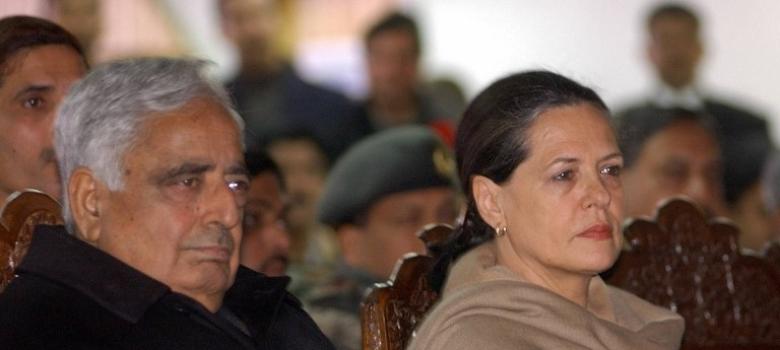After weeks of negotiation, the BJP and the PDP on Tuesday finally announced that they will be forming a government, having come to terms on the key matters of the Armed Forces Special Powers Act and Article 370 of the Constitution. The specifics of their Common Minimum Programme, however, will only be spelt out after the PDP patron meets with Prime Minister Narendra Modi this week. The outcome of these negotiations is the first government in the history of Jammu & Kashmir that includes the BJP, one that will give Sayeed a chance to redefine India's relationship with its most troubled state.
That's a long way to come for the former Congress member who built up India's Grand Old Party in the state only to shed all of his historical positions to set up a party that was anti-National Conference and welcoming towards moderate separatists. Although Sayeed has always been a political opportunist, the alliance with the BJP gives us a chance to potentially see what the 79-year-old chief minister actually hopes to do with the state.
Journeyman Mufti
In many ways, Sayeed is coming full circle. His first major act was to stick to the strain of Kashmiri politics that was more committed to integrating with India, by joining the Democratic National Conference, a splinter group of the National Conference, which would later merge with the Congress. Within the Congress also, he hitched his wagon to those going against the "anti-national elements," i.e. Sheikh Abdullah, by switching sides from chief minister GM Sadiq to Syed Mir Qasim, who would go on to make him a Cabinet minister in the state.
Former Prime Minister Indira Gandhi's accord with Abdullah in 1974, gave space for Sayeed – still a committed integrationist – to be picked as Congress chief in the state, to act almost as a foil for the Sher-e-Kashmir, a role he happily took to. Under difficult circumstances, Sayeed built up the Congress in the state and, when the party withdrew support to Abdullah in 1977, he suddenly had a chance to become J&K's youngest chief minister at 41.
But Abdullah got wind of his ambition, and called for the dissolution of the assembly. The next few years would be the most difficult for Sayeed, who would go on to lose elections from his home town that year, and again in 1983, both times to the NC. Former PM Rajiv Gandhi attempted to help resuscitate Sayeed's career in 1986 by bringing him to the Centre, where he was made union tourism minister.
Family Matters
But again his fate was determined by the machinations of the Nehru-Gandhis and the Abdullahs. The Rajiv Gandhi-Farooq Abdullah accord of 1987, saw the Congress and the NC contest elections together prompting Sayeed to finally quit not just the government but the party too. He jumped on board former PM VP Singh's Jan Morcha, contesting from Muzaffarnagar in Uttar Pradesh, and, as a first-time Member of Parliament, was made home minister.
India's first Muslim home minister, especially coming from a non-Congress government, could have had a huge impact on the nature of politics in the country. But right from the get-go things were problematic: five days after he was sworn in, the Jammu and Kashmir Liberation Front kidnapped his daughter, Rubaiya Sayeed. The home minister would push Abdullah's government in J&K to release five militants in return for Rubaiya, despite consensus suggesting that public outrage would have ensured her safety.
Sayeed, in order to spite Abdullah yet again and because of his political past in helping bring down the NC, recommended the BJP's Jagmohan – infamous for a brutal approach to counter-insurgency – to once again become governor of the state. Abdullah resigned because of Jagmohan's appointment and soon enough, the Centre would change the governor as well.
Coming Back Home
In the later years of the 1990s, Sayeed returned to the Congress under PV Narasimha Rao, but barely managed victories for his daughter, Mehbooba, from his hometown, and for himself for the Lok Sabha. In 1999, finally realising that the anti-Abdullah space within Kashmir could not be fought with a national party, Sayeed set up the People's Democratic Party.
For a while, the PDP was still reacting to the Nehru-Gandhis and the Abdullahs. It took advantage of disillusionment with the Abdullah family to come to power in the early 2000s, after also taking a softer tone on militants in the Valley. At the same time, it briefly set up an alliance with the Congress, but that later ended. It was at this time, however, that Sayeed also began reaching out to the BJP, even helping arrange a speech for former PM Atal Bihari Vajpayee in Srinagar.
As the NC's relevance in the state declines further – so much that Omar Abdullah even offered to support a PDP government in the state – Sayeed now has an opportunity to establish a government in the state that could change the way the rest of India approaches J&K.
But to do that he will have to learn to navigate with an entirely new set of characters in tow. With heavy representation from the BJP in the state assembly and a BJP government at the Centre, Sayeed's new challenge will be to set up a J&K government that people don't see as simply being remote-controlled by Delhi.










